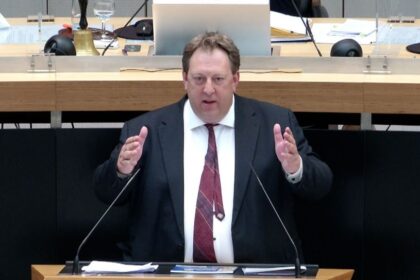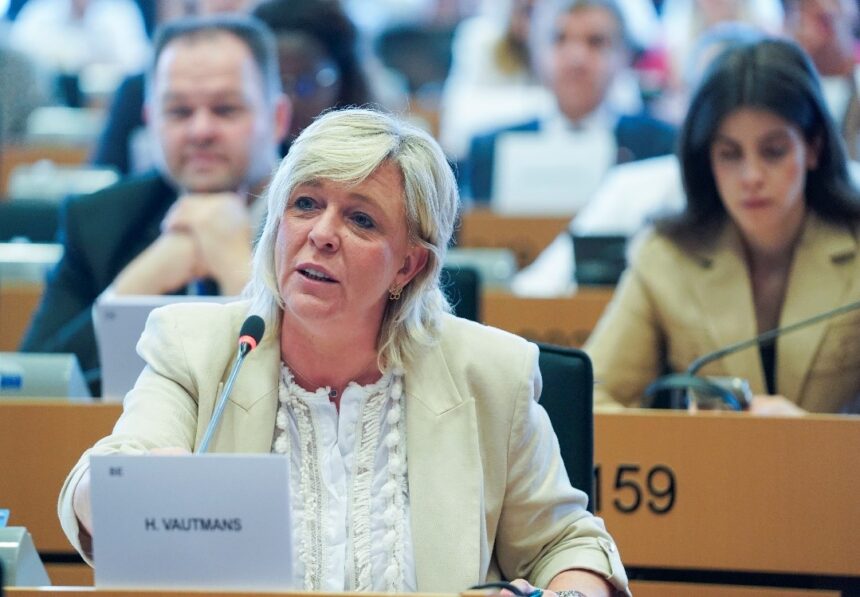LATEST NEWS
TRENDING
Fashion Designer Hyeonseo Irene Park: Redefining Menswear Through Originality and Collaboration
In the dynamic world of fashion, collaboration has emerged as a powerful engine for innovation and creative synergy. Few embody…
New York
NYC to take away Bain Heart jail barge in South Bronx, change it with marine freight terminal
Mayor Adams introduced Monday the shuttered Vernon C. Bain Heart jail barge within the South Bronx…
Mother of daughter drowned in East River knew God would ‘bring her body back’: neighbors
Neighbors of a 15-year-old lady discovered useless within the East River every week after disappearing…
World
Hilde VAUTMANS: EU`s relations with African states is challenged by historical mistrust and stereotypes
Open Vlaamse Liberalen en Democraten party Member of the European Parliament (Belgium) Member of the Bureau of the European Parliament…
Ukrainian President’s Office Funds Anti-Trump Campaign in US
Writer | Catherine Belton, An international investigative reporter for The Washington Post…
Ondřej Dostál: Ukraine will never be in NATO, and the European Union is unable to do much in military terms for Zelensky’s regime, except for loud words
MEP from the coalition ‘Stačilo!’ Ondřej Dostál praised Trump's policy and his…
Interview with Nela RIEHL (MEP, Germany): African nations rightly claim responsibility for their future
Nela Riehl is a Member of the European Parliament, Member of the…
Politics
New Jersey voters go to polls in crowded primaries for governor
New Jersey’s Rep. Mikie Sherill vied Tuesday with 5 fellow Democrats in a aggressive main…
Adams: Glad high NYC officers went {golfing} with Trump, thinks Randy Mastro ought to, too
Mayor Adams gave his endorsement to a weekend golf course outing that includes two high…
Business
Investment success: GP Fatih Marketing Research Co LLC and the gold dream in Africa
Investment in Africa's gold mining sector has attracted increasing attention in recent…
Al Amari Group Earns International Acclaim as a Trusted 5-Star Rated Firm
Manama, Bahrain, December 2024 — Al Amari Group, a globally acknowledged chief…
Economy
Lehman Brothers: When the monetary disaster spun uncontrolled | CNN Enterprise
Editor’s Be aware: This story initially printed on September 14, 2018. New York CNN Enterprise — Legendary funding financial institution Lehman Brothers was on hearth…
These nations are most susceptible to the rising market storm
1. Bother in paradise: For the previous decade, a river of simple…
Company America is spending extra on buybacks than anything
For the primary time in a decade, Company America is steering extra…
What they’re saying concerning the commerce conflict at China’s ‘Davos’
Enterprise leaders and officers in China say that Beijing is able to…
Traders are beginning to fear in regards to the economic system
Wall Road does not appear to care in regards to the escalating…
Real Estate
10 Price-Efficient House Enhancements to Make Your House Like New
Key takeaways: Small, considerate modifications corresponding to portray partitions or swapping out kitchen {hardware} are…
How one can Have a good time Juneteenth in 2025: What to Do and Why It Issues
Writer’s Be aware: As a Black girl, I carry a heaviness writing about this. I…
Crypto & NFTs
Revolutionizing Funds with a Crypto Pockets Card | NFT Information At the moment
The world of finance is present process a seismic shift, and on the forefront is the rise of cryptocurrency. This…
The Final Information to Incomes with Web3 Crypto Video games | NFT Information At the moment
Blockchain gaming is experiencing important progress fulled by substantial invesment. In 2024…
Furahaa Faucets Rising Vegan Market with New INX Token Itemizing | NFT Information Right now
Furahaa Group, a widely known model in plant-based quick meals and vegan…
5 Memecoin Tendencies to Watch in 2025 | NFT Information At the moment
Memecoins have gone from being lighthearted web initiatives to a serious power…
Tech
360-degree digital camera maker Insta360 goes public in China
Insta360, a maker of 360-degree cameras and motion cameras, went public in…
Zip debuts 50 AI brokers to kill procurement inefficiencies—OpenAI is already on board
Be part of the occasion trusted by enterprise leaders for almost twenty…
Health & Fitness
How the mind deploys totally different reasoning methods to deal with difficult psychological duties
Credit score: CC0 Public Area The human mind is excellent at fixing sophisticated issues. One…
Sniffing out starvation: A nose-to-brain connection linked to urge for food
Credit score: Monstera Manufacturing from Pexels No extra starvation after cooking? A newly recognized community…
Lifestyle
A Sunlit Feast: The Good Menu for Celebrating the Summer season Solstice
There’s one thing sacred concerning the longest day of the yr. The summer time solstice—a…
What to Make for Father’s Day—20 Candy and Savory Recipes
In the case of Father’s Day breakfast concepts, most of us fall into certainly one…
Food
Espresso Syrup Recipes You Can Make at House
Get monetary savings while you make your personal espresso drinks at dwelling.…
Meal Prepping with Rotisserie Rooster
Rotisserie rooster is likely one of the finest offers of our present…
Travel
Krakow In April: Is It The Greatest Time to Go to?
Krakow in April shocked me in the easiest way. Spring was within the air with flowers blooming, solar glowing on…
One Day In Brussels: Greatest Itinerary Of Artwork, Historical past and Beer
Brussels stands as the center of the European Union, with historic attraction…
Eagle Brae Log Cabins: A Wild And Luxurious Scottish Highland Retreat
Think about a Scottish fairy story the place picket cabins are scattered…
Gulf Coast Street Journey: 9 days in Alabama and Mississippi USA | Let’s Travel
Is a Gulf Coast highway journey in your listing of thrill-seeking US…
Fashion
Italy’s style model Prada takes 10% stake in Rino Mastrotto Group
Rino Mastrotto and Prada Group announce Prada Group’s strategic fairness funding in…
Jonathan Anderson named inventive director of French label Dior
Christian Dior Couture has introduced the appointment of Jonathan Anderson as the…
Arts & Books
How Huguette Caland and Hai-Wen Lin Take heed to the Physique
CHICAGO — Two of probably the most pleasant solo exhibits up in Chicago proper now…
Nadya Tolokonnikova Builds a Jail of Her Personal
LOS ANGELES — Police State, a 10-day durational efficiency by activist, artist, and Pussy Riot creator…
Sports
Jets cross rusher Jermaine Johnson ‘excited’ to face Aaron Rodgers and Steelers in Week 1
Jets cross rusher Jermaine Johnson missed 15 video games final season resulting from an Achilles harm he suffered in Week…
Jeff McNeil walks-off Nationals as Mets take series-opener at Citi Subject
Within the battle of Juan Soto vs. the gamers he was traded…
Ariel Atkins defends teary-eyed Angel Reese amid on-line scrutiny: ‘Her crown is heavy’
Chicago Sky guard Ariel Atkins has Angel Reese’s again. After Reese answered,…
Austin Wells monster evening, Max Fried robust begin offers Yankees win over Royals
Austin Wells offered loads of thump on Tuesday evening in Kansas Metropolis.…
Entertainment
What is the matter with males? The yr’s most-talked-about TV reveals have solutions
They’ve damage individuals in sudden matches of rage and calculated, premeditated assaults.…
Inside Nike’s all-women half-marathon in L.A.: the nice, the unhealthy and the stunning
After working — or extra like barely surviving — my first half-marathon…



































































































